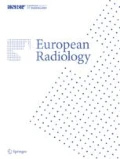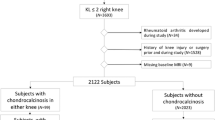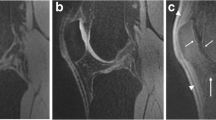Abstract
The purpose of this study was (1) to evaluate the sensitivity, specificity and accuracy of sagittal in vivo 3-T intermediate-weighted fast spin-echo (iwFSE) sequences in the assessment of knee cartilage pathologies using histology as the reference standard in patients undergoing total knee replacement, and (2) to correlate MR imaging findings typically associated with osteoarthritis such as bone marrow edema pattern (BMEP) and cartilage swelling with histological findings. Tibial plateaus and femoral condyles of eight knees of seven patients were resected during surgery, and sagittal histological sections were prepared for histology. Preoperative MRI findings were compared to the corresponding region in histological sections for thickness, surface integrity and signal pattern of cartilage, and histological findings in areas of BMEP and swelling were documented. The overall sensitivity, specificity and accuracy were 72%, 69% and 70% for thickness, 69%, 74% and 73% for surface and 36%, 62% and 45% for intracartilaginous signal pattern. For all cases of BMEP on MRI subchondral ingrowth of fibrovascular tissue and increased bone remodeling were observed. MRI using fat-saturated iwFSE sequences showed good performance in assessing cartilage thickness and surface lesions, while signal changes of cartilage were not suited to characterize the severity of cartilage degeneration as validated by histology.





Similar content being viewed by others
References
Felson DT (2004) An update on the pathogenesis and epidemiology of osteoarthritis. Radiol Clin North Am 42:1–9, v
Felson DT, Naimark A, Anderson J, Kazis L, Castelli W, Meenan RF (1987) The prevalence of knee osteoarthritis in the elderly. The Framingham osteoarthritis study. Arthritis Rheum 30:914–918
Recht MP, Goodwin DW, Winalski CS, White LM (2005) MRI of articular cartilage: revisiting current status and future directions. AJR Am J Roentgenol 185:899–914
Cheung LP, Li KC, Hollett MD, Bergman AG, Herfkens RJ (1997) Meniscal tears of the knee: accuracy of detection with fast spin-echo MR imaging and arthroscopic correlation in 293 patients. Radiology 203:508–512
Ha TP, Li KC, Beaulieu CF, Bergman G, Ch’en IY, Eller DJ, Cheung LP, Herfkens RJ (1998) Anterior cruciate ligament injury: fast spin-echo MR imaging with arthroscopic correlation in 217 examinations. AJR Am J Roentgenol 170:1215–1219
Kapelov SR, Teresi LM, Bradley WG, Bucciarelli NR, Murakami DM, Mullin WJ, Jordan JE (1993) Bone contusions of the knee: increased lesion detection with fast spin-echo MR imaging with spectroscopic fat saturation. Radiology 189:901–904
Bredella MA, Tirman PF, Peterfy CG, Zarlingo M, Feller JF, Bost FW, Belzer JP, Wischer TK, Genant HK (1999) Accuracy of T2-weighted fast spin-echo MR imaging with fat saturation in detecting cartilage defects in the knee: comparison with arthroscopy in 130 patients. AJR Am J Roentgenol 172:1073–1080
Broderick LS, Turner DA, Renfrew DL, Schnitzer TJ, Huff JP, Harris C (1994) Severity of articular cartilage abnormality in patients with osteoarthritis: evaluation with fast spin-echo MR vs arthroscopy. AJR Am J Roentgenol 162:99–103
Potter HG, Linklater JM, Allen AA, Hannafin JA, Haas SB (1998) Magnetic resonance imaging of articular cartilage in the knee. An evaluation with use of fast-spin-echo imaging. J Bone Joint Surg Am 80:1276–1284
Sonin AH, Pensy RA, Mulligan ME, Hatem S (2002) Grading articular cartilage of the knee using fast spin-echo proton density-weighted MR imaging without fat suppression. AJR Am J Roentgenol 179:1159–1166
De Smet AA, Monu JU, Fisher DR, Keene JS, Graf BK (1992) Signs of patellar chondromalacia on sagittal T2-weighted magnetic resonance imaging. Skeletal Radiol 21:103–105
McCauley TR, Kier R, Lynch KJ, Jokl P (1992) Chondromalacia patellae: diagnosis with MR imaging. AJR Am J Roentgenol 158:101–105
Dardzinski BJ, Mosher TJ, Li S, Van Slyke MA, Smith MB (1997) Spatial variation of T2 in human articular cartilage. Radiology 205:546–550
Mosher TJ, Dardzinski BJ, Smith MB (2000) Human articular cartilage: influence of aging and early symptomatic degeneration on the spatial variation of T2-preliminary findings at 3 T. Radiology 214:259–266
Rosenberg L (1971) Chemical basis for the histological use of safranin O in the study of articular cartilage. J Bone Joint Surg Am 53:69–82
Link TM, Steinbach LS, Ghosh S, Ries M, Lu Y, Lane N, Majumdar S (2003) Osteoarthritis: MR imaging findings in different stages of disease and correlation with clinical findings. Radiology 226:373–381
Jones CW, Smolinski D, Willers C, Yates PJ, Keogh A, Fick D, Kirk TB, Zheng MH (2007) Laser scanning confocal arthroscopy of a fresh cadaveric knee joint. Osteoarthritis Cartilage 15:1388–1396
Mankin HJ, Dorfman H, Lippiello L, Zarins A (1971) Biochemical and metabolic abnormalities in articular cartilage from osteo-arthritic human hips. II. Correlation of morphology with biochemical and metabolic data. J Bone Joint Surg Am 53:523–537
Zeger SL, Liang KY (1986) Longitudinal data analysis for discrete and continuous outcomes. Biometrics 42:121–130
Smith PJ, Hadgu A (1992) Sensitivity and specificity for correlated observations. Stat Med 11:1503–1509
Leisenring W, Pepe MS, Longton G (1997) A marginal regression modelling framework for evaluating medical diagnostic tests. Stat Med 16:1263–1281
Yoshioka H, Stevens K, Hargreaves BA, Steines D, Genovese M, Dillingham MF, Winalski CS, Lang P (2004) Magnetic resonance imaging of articular cartilage of the knee: comparison between fat-suppressed three-dimensional SPGR imaging, fat-suppressed FSE imaging, and fat-suppressed three-dimensional DEFT imaging, and correlation with arthroscopy. J Magn Reson Imaging 20:857–864
Hodler J, Berthiaume MJ, Schweitzer ME, Resnick D (1992) Knee joint cartilage defects: a comparative study of MR and anatomic sections. J Comput Assist Tomogr 16:597–603
Zanetti M, Bruder E, Romero J, Hodler J (2000) Bone marrow edema pattern in osteoarthritic knees: correlation between MR imaging and histologic findings. Radiology 215:835–840
Eckstein F, Sittek H, Milz S, Putz R, Reiser M (1994) The morphology of articular cartilage assessed by magnetic resonance imaging (MRI). Reproducibility and anatomical correlation. Surg Radiol Anat 16:429–438
Kladny B, Bail H, Swoboda B, Schiwy-Bochat H, Beyer WF, Weseloh G (1996) Cartilage thickness measurement in magnetic resonance imaging. Osteoarthr Cartil 4:181–186
McGibbon CA, Trahan CA (2003) Measurement accuracy of focal cartilage defects from MRI and correlation of MRI graded lesions with histology: a preliminary study. Osteoarthritis Cartilage 11:483–493
Othman SF, Li J, Abdullah O, Moinnes JJ, Magin RL, Muehleman C (2007) High-resolution/high-contrast MRI of human articular cartilage lesions. Acta Orthop 78:536–546
Trattnig S, Huber M, Breitenseher MJ, Trnka HJ, Rand T, Kaider A, Helbich T, Imhof H, Resnick D (1998) Imaging articular cartilage defects with 3D fat-suppressed echo planar imaging: comparison with conventional 3D fat-suppressed gradient echo sequence and correlation with histology. J Comput Assist Tomogr 22:8–14
Uhl M, Ihling C, Allmann KH, Laubenberger J, Tauer U, Adler CP, Langer M (1998) Human articular cartilage: in vitro correlation of MRI and histologic findings. Eur Radiol 8:1123–1129
Fragonas E, Mlynarik V, Jellus V, Micali F, Piras A, Toffanin R, Rizzo R, Vittur F (1998) Correlation between biochemical composition and magnetic resonance appearance of articular cartilage. Osteoarthritis Cartilage 6:24–32
Paul PK, Jasani MK, Sebok D, Rakhit A, Dunton AW, Douglas FL (1993) Variation in MR signal intensity across normal human knee cartilage. J Magn Reson Imaging 3:569–574
Li X, Benjamin Ma C, Link TM, Castillo DD, Blumenkrantz G, Lozano J, Carballido-Gamio J, Ries M, Majumdar S (2007) In vivoT(1rho) and T(2) mapping of articular cartilage in osteoarthritis of the knee using 3T MRI. Osteoarthritis Cartilage 15:789–797
Bashir A, Gray ML, Hartke J, Burstein D (1999) Nondestructive imaging of human cartilage glycosaminoglycan concentration by MRI. Magn Reson Med 41:857–865
Billinghurst RC, Dahlberg L, Ionescu M, Reiner A, Bourne R, Rorabeck C, Mitchell P, Hambor J, Diekmann O, Tschesche H, Chen J, Van Wart H, Poole AR (1997) Enhanced cleavage of type II collagen by collagenases in osteoarthritic articular cartilage. J Clin Invest 99:1534–1545
Link TM, Stahl R, Woertler K (2007) Cartilage imaging: motivation, techniques, current and future significance. Eur Radiol 17:1135–1146
Gold GE, Busse RF, Beehler C, Han E, Brau AC, Beatty PJ, Beaulieu CF (2007) Isotropic MRI of the knee with 3D fast spin-echo extended echo-train acquisition (XETA): initial experience. AJR Am J Roentgenol 188:1287–1293
Yao L, Pitts JT, Thomasson D (2007) Isotropic 3D fast spin-echo with proton-density-like contrast: a comprehensive approach to musculoskeletal MRI. AJR Am J Roentgenol 188:W199–W201
Acknowledgements
This work was supported by Glaxo Smith Kline (GSK) Inc., Research and Development, London, UK, NIH R01 AR46905-01 and NIH K25 AR053633.
Author information
Authors and Affiliations
Corresponding author
Rights and permissions
About this article
Cite this article
Saadat, E., Jobke, B., Chu, B. et al. Diagnostic performance of in vivo 3-T MRI for articular cartilage abnormalities in human osteoarthritic knees using histology as standard of reference. Eur Radiol 18, 2292–2302 (2008). https://doi.org/10.1007/s00330-008-0989-7
Received:
Revised:
Accepted:
Published:
Issue Date:
DOI: https://doi.org/10.1007/s00330-008-0989-7




